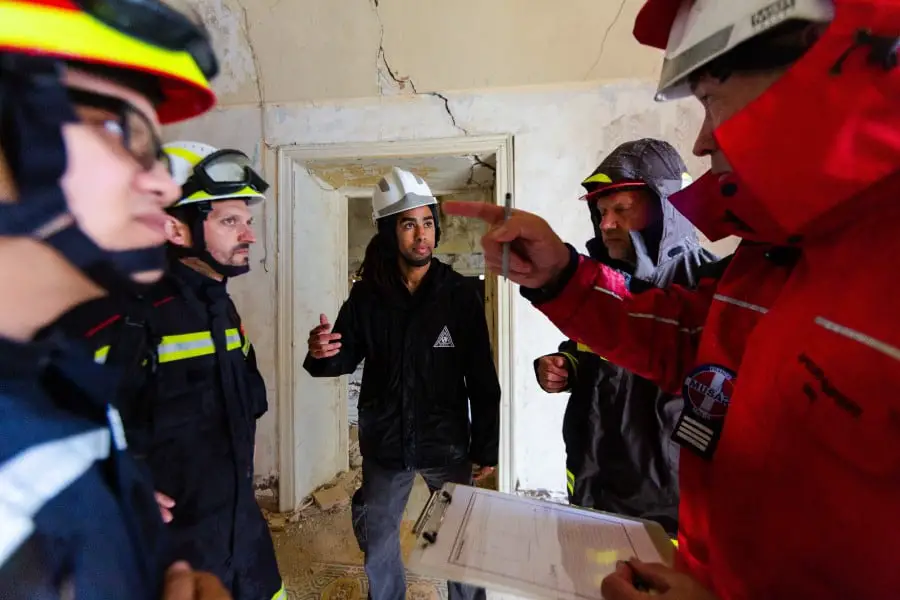This page contains affiliate links. This means if you a follow a link and make a purchase, at no additional cost to you, Humanitarian Careers will receive a commission. Thank you for supporting the site.
The NGO sector has a significant need for qualified engineers. Organisations responding to crises and disasters often require engineers to assist in areas such as shelter construction, water and sanitation works, planning infrastructure projects, and even software development.
If you are working as an engineer and interested in taking a job with an NGO, explore our breakdown of some of the most common engineering roles NGOs recruit for. This guide is also useful for those wanting to pursue a career in the NGO sector and wondering if training as an engineer may be a route in.
Shelter Advisor
A first job in the NGO sector that engineers can take is as a Shelter Advisor. When people are affected by disasters, conflicts and displacement they often lose their homes. NGO’s run projects providing shelter to crisis affected people. This assistance can be in the form of establishing refugee camps, or giving people materials or financial aid to rebuild their homes.
NGO Shelter Advisors provide technical guidance to shelter projects. This often requires an engineering background. Shelter Advisors can be based at HQ level providing guidance to country missions, or at field-level directly giving advice to teams implementing shelter programmes.
How to Apply
If you are a trained engineer and wanting to work in the NGO sector, working in the shelter function is a good aim. To become a Shelter Advisor, you will likely need an engineering qualification, as well as some years’ experience working on either NGO shelter programmes or coordinating engineering work in disaster or post-conflict contexts.
Construction Engineer
A second type of NGO job often taken by engineers is as a construction engineer. Many NGOs undertake building projects – from constructing health clinics, to modifying their offices and guesthouses to improve security. The role of the construction engineer in an NGO is to oversee building projects, ensuring both its safety and quality.
Another aspect of the construction engineer role in the NGO sector is working with the local building teams, or external suppliers, to develop construction plans, source materials, check building sites and supervising construction works. Construction engineers in an NGO may be assigned to a single large-scale building project, or provide advice across multiple constructions.
How to Apply
To apply to become a construction engineer with an NGO you will need an educational background in engineering. You will also need a proven track record of working on construction projects in a similar context to where NGOs work – including in low-income countries, crisis and disaster zones and/or post-conflict settings.
WASH Programme Manager
Another NGO job open to engineers is WASH Programme Manager. In the NGO sector, WASH stands for water sanitation and hygiene. People affected by conflicts, disasters and poverty often lack access to clean water. Many NGOs run projects aiming to address these needs. The job of the WASH Programme Manager is to oversee all aspects of an NGO’s WASH project.
Engineers working as WASH Programme Managers in NGOs will be responsible for implementing the organisations WASH works in the field. They will also line-mange a number of WASH Officers, who will assist with the day-to-day running of the NGOs WASH programme. The WASH Programme Manager is usually based at country office level.
How to Apply
If you are an engineer and interested in working for an NGO as a WASH Programme Manager, or more generally in a WASH role, you will need a formal qualification in water engineering. As a senior role, WASH Programme Managers will also need several years’ experience within the NGO sector, ideally working on WASH projects in the field.
Sanitation Engineer
As well as needing access to clean water, disaster and crises affected populations also often lack good sanitation. A commonly recruited engineering role within NGOs is that of sanitation engineer. The job of the sanitation engineer is to provide technical guidance to an NGO’s WASH programme in regards to waste management and sanitation.
Sanitation engineers working for NGOs can be deployed at field-level to directly work on sanitation projects. NGO sanitation engineers can also work at HQ or mission office level providing guidance to a range of projects across a country or region.
How to Apply
If you are looking to work as a sanitation engineer with an NGO you will need to have completed your studies and be qualified to work in the field of engineering. You will also need to have strong knowledge and experience of sanitation works. Previous experience working in the kinds of contexts NGOs operate in – low-income countries, disaster, refugee camp and post-conflict settings, would be beneficial.
NGO Engineering Online Courses
If you want to work as an engineer for a NGO, we highly recommend the online short course Introduction to Public Health Engineering in Humanitarian Contexts. NGO engineers must use their skills to assist aid projects, and this is one of the best online courses showing how engineering skills can be used in humanitarian responses. Follow the link to enrol.
Engineers working for NGOs often operate in difficult, remote, and sometimes hostile environments. To ensure the effective implementation of their programmes, project management skills are a must. We recommend the online course Engineering Project Management for anyone wanting to be an engineer job with a NGO. Click the link for more information.
Another online short course we highly recommend for those wanting to get a NGO job as an engineer is Basics of Civil Engineering in Construction. Many NGO engineering projects involve construction, sometimes in tough contexts. This beginner’s course is ideal for those who want to know more about engineering and looks good on the CV of anyone applying for a NGO engineering job. Follow the link to the course’s page.
Infrastructure Project Manager
Many NGOs implement infrastructure projects in countries affected by crises and disasters. Engineers are commonly employed to manage these projects. NGOs need infrastructure engineers to oversee the planning and construction of infrastructure projects. The job of the NGO infrastructure engineer is also to assist with liaising with the country’s authorities and working with their engineers on large infrastructure projects.
Infrastructure engineers are generally only recruited by large NGOs, as undertaking major infrastructure projects requires significant financial and material resources. In many NGOs the infrastructure engineer will work as part of a wider team assisting with the construction of medium and large-scale building projects.
How to Apply
Engineers looking to work in an NGO as an infrastructure engineer will need to have significant experience working on large scale construction projects. They will also need some previous experience working on related projects in challenging contexts. A formal qualification, such as a masters degree, in engineering, is also often required.
Software Engineer
Although maybe you wouldn’t in think it, but actually some NGOs recruit software engineers. The NGO sector is becoming increasingly professional. As a result, NGOs need to adopt software and tools to help them track and monitor their work. Many NGOs also develop interfaces for working on grant proposals, HR, finance and logistics. Software engineers can be recruited to develop such tools.
Some large NGOs will recruit an in-house software engineer to build computer programs and apps they need. Many smaller NGO’s may outsource the building of the tools they require. This means if you want to work as a software engineer for an NGO you are probably more likely to be hired on a short-term contract to develop a specific program.
How to Apply
Software engineers looking to work for NGOs should have a strong technical understanding of building software for small and medium-sized business. NGO’s will look for software engineers that can tailor programs to their specific needs, as well as have an understanding of how the end user – NGO staff, are likely to use the tool in the field.
Water Systems Engineer
One type of engineering role that is regularly recruited for by NGOs is water systems engineers. As we discussed, NGOs often run WASH projects providing clean and safe water to people in need. The position of the water systems engineer is to work directly on the planning, instillation and maintenance of water systems that an NGO is working on.
Water systems engineers employed by an NGO almost always work at field-level, providing on-the-spot guidance to WASH project teams. However, there may be aspects of the water systems engineer role that are done at country or HQ level – providing technical guidance to NGO missions.
How to Apply
You will need an educational background in water engineering to get a job as a water system engineer with an NGO. You will also likely need experience working on engineering projects in similar contexts to where NGOs operate.
Consultant
A final position in many NGOs that is taken by engineers is that of a consultant. NGOs regularly recruit engineers to provide technical guidance on specific projects, however lack the need to recruit a full-time position. Therefore, engineering consultants are brought on to produce specific pieces of work or provide technical guidance as needed.
Engineering consultants working with NGOs can either be independent or work as part of a consultancy firm. They will often join an NGO for a set period of time, from a few weeks to several months, to provide engineering guidance. They can work from home reviewing plans and providing inputs, or be deployed to the field to give first-hand assistance to engineering projects.
How to Apply
To become an engineering consultant with an NGO you will need significant experience in engineering and likely in NGO work. However, for some technical engineering consultancy jobs your knowledge of engineering may be more paramount than having worked for an NGO before. You will definitely need a high-level qualification in engineering to become a consultant in the NGO sector.
If you want to learn more about working for an NGO, including in an engineering role, explore our page on the top NGO online courses here.





